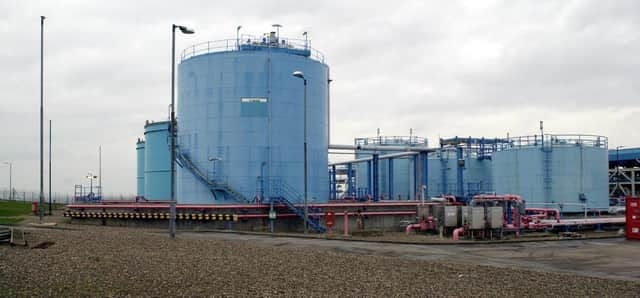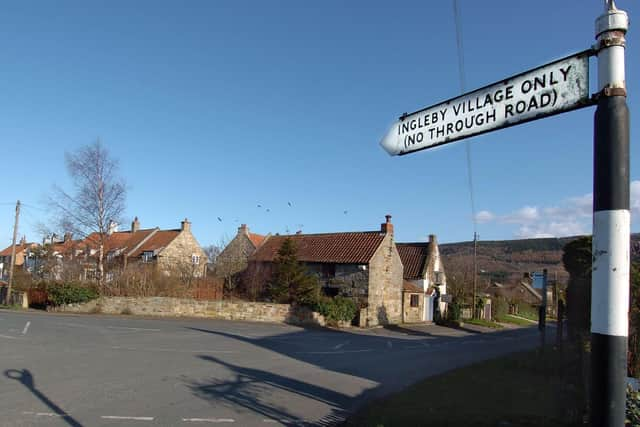Dangers of Londoners land-grabbing parts of rural Yorkshire – David Behrens


This is Easington, a few short miles up the coast from the Spurn Nature Reserve. It’s one of the largest energy plants in Europe, and the last place on earth in which you would reasonably expect to run out of gas.
Nevertheless, I managed it last week.
Despite the closeness of these giant storage vessels to our village, the supply pipes bypass it completely. So if you want central heating here, you need either an oil tank in the garden or a row of tall red gas bottles lined up like sentries. So much for the green agenda.


Advertisement
Hide AdAdvertisement
Hide AdI had been told that an automatic switch would tell me when the bottles at Behrens Towers were nearly empty, but it didn’t – and as a result the house was as cold as a meat locker last Saturday morning.
It is in situations like this, far off the beaten track, that you quickly discover how effective the local infrastructure is. I won’t bore you with the details, but the fact that it took less time to put things right than it takes to throw a Christmas party at Downing Street tells you plenty. The people here are used to far worse, and my naïveté as a newcomer was plain for them all to see.
“Which part of the south have you come from?” I was asked more than once, and the answer – that I was from no further afield than the other side of Yorkshire – somehow made it worse. Landlocked suburbanites like me are used to having services delivered on a plate. There is a level of expectation – entitlement, even – that is absent in less densely populated areas.
Advertisement
Hide AdAdvertisement
Hide AdBut the assumption that I was a refugee from the Home Counties was not based solely on my ineptitude in managing an off-grid fuel system; the post-Covid economy has created a measurable trend towards Northern migration.
Suddenly freed of the requirement to be less than 10 minutes in an Audi from the nearest train station, Londoners are discovering how much more they can get for their money in bits of the country they know only from their school geography lessons. The result is that property prices are rising in areas that were backwaters until just last year. At the same time, the supply chain crisis has caused an exponential rise in building costs – with the result that tradespeople who quoted for jobs three months ago are being forced to rewrite their estimates.
Nowhere was the phenomenon more evident this week than in Ingleby Arncliffe, on the fringe of the North York Moors. Villagers there have spent 12 years lobbying for affordable new homes that might breathe new life into a community which has seen no new housebuilding for a generation and has lost its local school in the meantime.
Advertisement
Hide AdAdvertisement
Hide AdBut no sooner was a plan approved to deliver 18 homes for locals, including young people who would otherwise have to leave the area, the developer announced it could no longer afford to build them.
This perfect economic storm is creating an unexpected consequence of levelling up parts of the North. Desirable pockets of rural Yorkshire are being land-grabbed as outposts of the capital, causing a redistribution of wealth that has some positive repercussions but also some potentially disastrous ones. In the Dales and Moors especially, areas given over to farming become unsustainable if there are no more farmers, just superannuated stockbrokers.
It’s not exclusively an outcome of the pandemic. As early as February last year, Sheffield and Leeds were reporting rises almost on a par with Manchester in the number of escapees arriving from the capital – some 10 times higher than a decade previously. But the last 18 months have shifted the migration pattern from the cities to the countryside, as people – myself included – began to reassess their priorities.
That becomes a problem if levelling-up comes at the expense of those who already live in the newly prosperous areas – the very people who should be benefiting. Rural Yorkshire needs new blood but it also needs those whose lifetime of experience and knowledge help sustain it. Without them, the future could be as finite as my gas supply.
Advertisement
Hide AdAdvertisement
Hide AdSupport The Yorkshire Post and become a subscriber today. Your subscription will help us to continue to bring quality news to the people of Yorkshire. In return, you’ll see fewer ads on site, get free access to our app and receive exclusive members-only offers. Click here to subscribe.
Comment Guidelines
National World encourages reader discussion on our stories. User feedback, insights and back-and-forth exchanges add a rich layer of context to reporting. Please review our Community Guidelines before commenting.